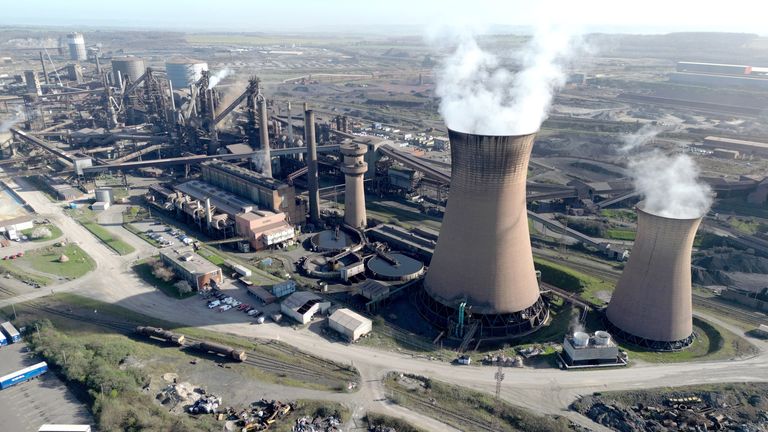UK Seizes Control of British Steel: Emergency Powers Invoked to Prevent Critical Plant Closure
In an extraordinary move, UK lawmakers convened a rare Saturday parliamentary session to pass emergency legislation granting the government direct control over British Steel's Scunthorpe plant. The unprecedented intervention aims to prevent the imminent shutdown of the nation's last remaining virgin steel producer, protecting 3,000 jobs and averting a situation that would make Britain the only G7 nation unable to produce steel from raw materials—a critical capability for economic and national security.
Government Intervenes in Crisis at Last UK Steel Plant
The Steel Industry (Special Measures) Bill, passed during an emergency Saturday session on April 12, 2025, grants Business Secretary Jonathan Reynolds sweeping powers to direct British Steel's board and workforce, ensure workers are paid, and order the raw materials necessary to keep the plant's two blast furnaces operational Reuters1. This emergency session marked the first weekend recall of Parliament during a recess since the Falklands War in 1982, underscoring the gravity of the situation.
The crisis escalated after British Steel's Chinese owner, Jingye Group, announced it was considering closing the Scunthorpe plant's blast furnaces due to significant financial losses. According to company statements, the plant is losing approximately £700,000 ($910,000) per day "as a result of challenging market conditions and increased environmental costs" AP News2.
Prime Minister Keir Starmer emphasized the critical nature of the intervention during a visit to the steelworks: "The bill will go through today... and that means that we will then be in control of the site." Starmer added, "Jobs, investment, growth, our economic and national security are all on the line" BBC3.
The government's drastic action came after Jingye Group's recent decision to cancel orders for iron pellets used in the blast furnaces, which would have forced their closure within days. Reynolds criticized Jingye for making "excessive" demands during months of negotiations and stated that without intervention, the company would have "irrevocably and unilaterally closed down primary steel making at British Steel" AP News2.
Global Trade Tensions and Stakeholder Reactions
The British Steel crisis unfolds against a backdrop of intensifying global trade tensions, particularly between the United States and China. A significant factor exacerbating the plant's financial struggles is the recent decision by U.S. President Donald Trump to impose 25% tariffs on imported steel AP News2. These tariffs have further strained the already challenging market conditions for British steel exports.
The intervention has received broad support from key stakeholders. UK Steel and unions representing steelworkers have welcomed the legislation Reuters1. The bill cleared its initial stages in Parliament without opposition, reflecting cross-party recognition of the plant's strategic importance.
Tensions escalated further on the morning of the parliamentary vote, with reports that Jingye executives attempted to enter the Scunthorpe plant around 8 am, prompting police intervention The Guardian4. This dramatic development underscores the fractious relationship between the government and the Chinese owners.
Reform UK has advocated for full and immediate nationalization of the plant, reflecting growing political pressure in regions where manufacturing decline has been most acutely felt Sky News5.
Strategic Importance and Domestic Impact
Business Secretary Jonathan Reynolds articulated the government's position in stark terms: "We could not, will not and never will stand idly by while heat seeps from the UK's remaining blast furnaces" AP News2. This statement reflects growing concerns about maintaining domestic industrial capability in an era of retreating globalization.
The significance of the Scunthorpe plant extends beyond its immediate economic footprint. If the blast furnaces were to close, Britain would become the only G7 country unable to produce virgin steel from iron ore and other raw materials Reuters1. This capability is considered essential for national security, defense manufacturing, and the transition to green energy production.
The impact on Scunthorpe itself would be devastating. With 3,000 direct jobs at stake and many more in supporting industries, local residents have expressed fears about the community's future. One steelworker told Sky News, "It will cripple the town," highlighting the deep interconnection between the plant and the regional economy The Guardian6.
Long-Term Implications and Nationalization Prospects
While the emergency legislation stops short of full nationalization, Reynolds explicitly stated that "a transfer of ownership to the state remains on the table, and it may well at this stage, given the behaviour of the company, be the likely option" Reuters1. This suggests that the government's intervention may evolve from emergency control to outright ownership.
The situation has been described as "a form of martial law invoked and applied to private enterprise" Sky News5, raising significant questions about precedent and the future relationship between government and strategic industries in the UK.
Long-term viability remains a challenge. British Steel was already struggling in an oversupplied global market before recent energy cost increases. The government had previously offered Jingye Group substantial financial support for modernization and decarbonization of the plant, reportedly including up to £500 million in aid Sky News7, but negotiations broke down.
The government's intervention also occurs within a complex geopolitical context. As one analysis notes, "one can imagine how a UK move to wrestle control of a site of national importance from its Chinese owner might go down with a US president currently engaged in a fierce trade war with Beijing" Sky News5.
A Watershed Moment for UK Manufacturing
The emergency government takeover of British Steel represents a critical juncture for UK industrial policy and manufacturing capability. As global trade patterns shift and national security concerns intensify, the fate of the Scunthorpe plant may signal a broader reconsideration of the state's role in preserving strategic industries. Will this intervention mark the beginning of a new industrial strategy, or will economic realities continue to challenge the long-term viability of traditional manufacturing in Britain?



